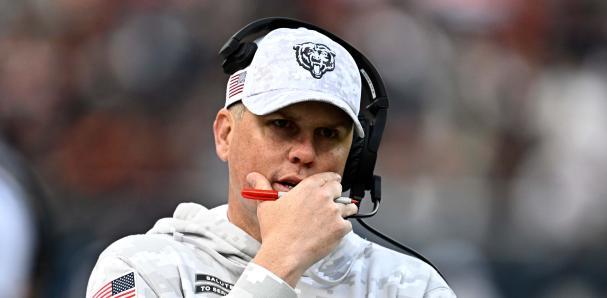
The Chicago Bears are once again at a crossroads, with the latest seismic shift coming in the form of the firing of offensive coordinator Shane Waldron. This bold move has sparked a flurry of debate among fans, analysts, and former players alike. Waldron’s departure comes at a time when the Bears’ offense has been under intense scrutiny for its underperformance, but the bigger question remains: Will firing Waldron actually solve the team’s deep-rooted issues, or will it only serve to make matters worse?
The Case for Firing Shane Waldron
Waldron was brought in to help turn around a Bears offense that has been stagnating for years. The team has consistently ranked near the bottom in key offensive categories, from total yardage to points scored. Under Waldron, there were flashes of potential early on — particularly with the development of quarterback Justin Fields — but the offensive play-calling was often criticized for being predictable and uninspiring.
The Bears’ offense frequently seemed out of sync, struggling to establish any consistent rhythm. Fields, who was expected to take a step forward in his third season, often looked lost and frustrated on the field. While Waldron could not be blamed entirely for the lack of support around Fields, many believe the coordinator’s playbook didn’t maximize the quarterback’s unique skill set, nor did it take advantage of his mobility.
Waldron’s firing might seem justified from this perspective. His departure signals a desire for change, a signal that the Bears are ready to do whatever it takes to fix their offensive woes. The decision is especially understandable considering the mounting pressure on the franchise to show progress, especially with a promising young quarterback like Fields, whose future may be jeopardized if he continues to play in a stagnant offensive system.
The Bigger Question: Will This Make the Bears’ Problems Worse?
While firing Waldron may appear to be a necessary step, it brings with it a set of risks. The Bears have undergone numerous coaching changes in the past decade, and it’s fair to ask whether this turnover is merely a symptom of a much deeper issue within the organization. The Bears have cycled through multiple quarterbacks, coordinators, and head coaches, yet they remain mired in mediocrity. Is Waldron the problem, or is the dysfunction within the franchise itself the true root of their struggles?
One of the biggest challenges facing the Bears is the instability at the top. General manager Ryan Poles and head coach Matt Eberflus are both relatively new to their roles, and their lack of cohesion with Waldron could have contributed to the team’s offensive struggles. But firing Waldron without addressing the broader organizational issues — from poor roster construction to a lack of cohesive leadership — could be a case of treating the symptom, not the disease.
Moreover, the Bears’ offensive line remains a glaring weakness, limiting Fields’ ability to be successful, no matter who the coordinator is. The Bears’ inability to protect their quarterback or provide a consistent running game has been one of their most significant obstacles. Waldron, while criticized for his play-calling, didn’t have the luxury of a strong offensive line or a proven group of skill players to work with. Without a major overhaul of the roster, any new offensive coordinator will likely face the same challenges.
The Case Against Firing Waldron
Firing Waldron now might be premature, given the circumstances. The Bears’ offense didn’t just suddenly become bad overnight; it has been a problem for years. The franchise’s inability to properly evaluate and build around Fields has been the crux of their offensive struggles. Waldron, for all the criticism, was not the one responsible for the Bears’ broader roster-building issues.
In fact, many analysts point out that the blame should be more evenly distributed. Fields’ development has been hampered by poor protection from the offensive line, a lack of quality receivers, and a general failure to establish a functional system. These issues, while partially Waldron’s responsibility, stem from higher levels of decision-making — starting with the front office. Without addressing these core issues, the next offensive coordinator will likely face similar challenges, leading to yet another frustrating cycle of failure.
Additionally, the firing of Waldron could further destabilize an already fragile locker room. Coaching changes mid-season often lead to confusion and frustration among players, who are left to wonder what the future holds. A lack of continuity and stability within the coaching staff could lead to more inconsistency, both on the field and in the locker room.
Conclusion: A Desperate Move or a Necessary Step?
In the end, the Bears’ decision to fire Shane Waldron represents a desperate move — but not one that’s entirely without merit. The franchise has struggled with offensive ineptitude for far too long, and change was inevitable. However, the real question is whether firing Waldron is a symptom of a bigger problem within the Bears’ organization, or if it truly will bring about the change the team so desperately needs.
If the Bears do not address their underlying issues — from their front office to their roster construction — the firing of Waldron may just be another empty gesture. But if this move is the first step in a larger reorganization, with a focus on building a more competent and stable offensive system, it could eventually lead to long-term success. For now, Bears fans will have to wait and see if this controversial decision ultimately solves their offensive woes or if it deepens the franchise’s struggles even further.




